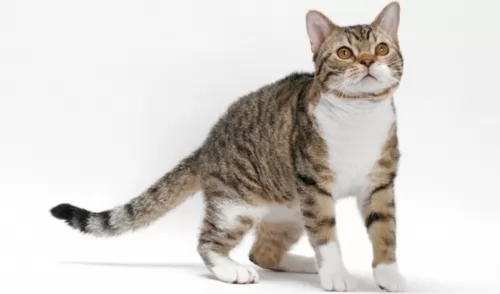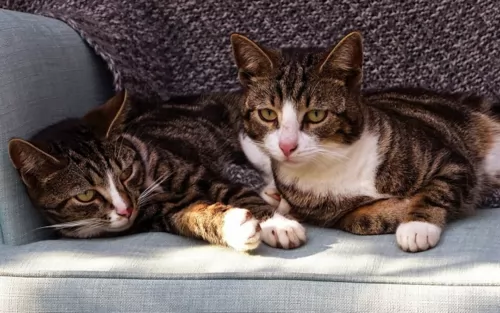 Petzlover
Petzlover American Wirehair is originated from United States but Thai is originated from Thailand. Both American Wirehair and Thai are having almost same weight. American Wirehair may live 4 years less than Thai. Both American Wirehair and Thai has same litter size. Both American Wirehair and Thai requires Low Maintenance.
American Wirehair is originated from United States but Thai is originated from Thailand. Both American Wirehair and Thai are having almost same weight. American Wirehair may live 4 years less than Thai. Both American Wirehair and Thai has same litter size. Both American Wirehair and Thai requires Low Maintenance.
 The American Wirehair started as a spontaneous mutation so that somewhere along the line, an unusual litter with this unique wiry type of fur was born.
The American Wirehair started as a spontaneous mutation so that somewhere along the line, an unusual litter with this unique wiry type of fur was born.
The cat hails from New York and it was in 1966 that a couple of barn cats had a litter of kittens, some of which were born with this peculiar wiry hair. Only one kitten survived – a male – and later it was discovered that the gene responsible for the wirehair coat was dominant so that only one parent required the gene to produce Wirehair offspring.
Today, all American Wirehairs are descendants of this one surviving male kitten. Today the breed is still fairly rare. It is, however, recognized by the four largest North American cat associations.
 The Thai cat is also referred to as the Wichien Maat. It is an old cat breed descended from the cats of Thailand.
The Thai cat is also referred to as the Wichien Maat. It is an old cat breed descended from the cats of Thailand.
The Wichienmaat is a cat that was spoken of already centuries ago in a book. Over the years, the cat has remained much the same as its original breeding. Today this cat is popular in Thailand.
It was in the late 1800s that the Wichienmaat was imported to the West by British cat breeders, and the cats became known as ‘Siamese’.
Western breeders wanted to add in some other qualities to the cat and through selective breeding, they developed a finer-boned type of Siamese cat. Today some people refer to these cats as Old-Style Siamese, while others refer to them as Thais, but they are one and the same.
 The American Wirehair is a medium-sized cat, strong and powerful, and can weight 5, 6 or 7 kg.
The American Wirehair is a medium-sized cat, strong and powerful, and can weight 5, 6 or 7 kg.
The head is in proportion to the body and the cat has a strong muzzle and chin. The ears are medium-sized and are rounded at the tips while the eyes are large, round, and set well apart.
It’s the coat that draws attention as unlike a regular cat’s silky fur, the fur of this cat is springy, coarse and wiry to the touch. The coat can be any color or pattern. It is the cat’s very coat that distinguishes it from all other breeds.
With this coat, the less grooming the better. Brushing or combing can damage it, so unless he is shedding heavily, leave it alone.
The only other care he needs really is nail trimming, to check inside his mouth for bad teeth and to also check inside his ears for redness. Both the teeth and the ears can be a source of pain for your pet.
The American Wirehair may have a harsh coat but there is nothing harsh about his personality at all. He is amicable and loving, getting on well with all members of his human family.
He is an independent cat and while he loves spending time with his family, he is quite capable of spending time on his own as well.
The American Wirehair is a playful cat so you want to give him some toys to entertain himself for when you’re not around.
 The Thai is a short-haired, glossy cat and comes in a variety of colors but no white.
The Thai is a short-haired, glossy cat and comes in a variety of colors but no white.
The soft, silky fur is a warm cream shade, much like the Siamese, with dark brown, black, smoky colored extremities.
The Thai is considered to be a medium-sized cat and he will weigh between 3 an 6kg. The body is lean, slender and muscular, the ears medium size with rounded tips and set wide apart. The eyes are are beautiful blue, large and slightly slanted.
Thai cats are curious, active, and intelligent. They are also social and vocal and are able to communicate to their human owners what they want.
They thrive on getting lots of attention from their humans and will even follow them around the house. They do well with children in the home when the children have been taught to be kind and respectful to animals.
 The American Wirehair makes a splendid pet, and while he isn’t the best breed for children, he can make a good pet with those children who have been taught kindness, gentleness and respect for animals.
The American Wirehair makes a splendid pet, and while he isn’t the best breed for children, he can make a good pet with those children who have been taught kindness, gentleness and respect for animals.
He is calm, quiet, dependent, and sociable and by providing him with a good home, he’ll prove to be a wonderful pet and companion.
 The Thai cat is social and friendly and enjoys time spent with his human family. They don’t like to be left alone for long periods of time and it just might be a good idea to have a feline friend for this cat.
The Thai cat is social and friendly and enjoys time spent with his human family. They don’t like to be left alone for long periods of time and it just might be a good idea to have a feline friend for this cat.
He is also a vocal cat and lets you know his feelings and certainly when he wants his food. The Thai wants to be your friend and companion and he will thrive in any kind of home when he is made to feel important and loved.
 The American Wirehair is a healthy type of cat but any cat can develop health issues.
The American Wirehair is a healthy type of cat but any cat can develop health issues.
Be aware of Hypertrophic cardiomyopathy – a common form of heart disease in cats where there is the thickening of the heart muscle.
Be careful of overfeeding your cat as obesity is a major contributory disease to many illnesses that a cat gets. Excess weight can contribute to diabetes and arthritis and put pressure on your cat’s joints. Certainly, carrying extra weight can shorten your cat’s life. Make sure your cat gets smaller, healthier meals and that he is active and exercised.
 These cats are known for their good health. Just because he is considered healthy, you can't ignore looking out for signs that he may be in distress.
These cats are known for their good health. Just because he is considered healthy, you can't ignore looking out for signs that he may be in distress.
There are actually a whole lot of common cat illnesses your cat could succumb to, so you want to be sure you recognize some of the signs such a vomiting, diarrhea, lethargy, and battling to urinate. Make sure that the eyes are always bright and clear and that he is his active self.
Have your Thai cat vaccinated against the deadly cat diseases that there are. You will also need to have your cat dewormed. Speak to your vet about the best way to prevent fleas.
 Brush the cat gently once a week. Your cat will love the connection you and he has. While you brush him, make a point of checking inside his ears and inside his mouth as well. It is also time to trim his nails. If you are hesitant to do this, ask you vet for suggestions or you can make use of a pet groomer too.
Brush the cat gently once a week. Your cat will love the connection you and he has. While you brush him, make a point of checking inside his ears and inside his mouth as well. It is also time to trim his nails. If you are hesitant to do this, ask you vet for suggestions or you can make use of a pet groomer too.
Make sure your pet cat is free from parasites such as fleas, ticks and heartworm. Your vet can recommend a treatment and it is also a good idea to talk to your vet about vaccines for your cat.
Have your American Wirehair spayed or neutered to prevent unwanted kittens and to promote better health for your cat.
Always choose healthy food for your pet, bearing in mind that cats are carnivores, which means that you need to choose cat-food for your pet that has fish and meat in it. It can be difficult making good homemade food for your cat but there are excellent commercially prepared cat foods to ensure your cat gets the correct balance of nutrients and calories. Bear in mind that your cat's nutritional requirements change through their different stages of life.
 You’ll see your Thai cat preening and grooming, but he will still need to have the silky coat brushed gently to keep it shiny and healthy.
You’ll see your Thai cat preening and grooming, but he will still need to have the silky coat brushed gently to keep it shiny and healthy.
The brushing will make him happy as he just loves the attention, and it is good for the cat’s fur – to remove dust and loose hairs.
Your Thai cat is a scratcher just like any other cat, and if you don’t want to have your furniture scratch, invest in a scratching post.
Examine the inside of your cat’s ears to make sure they are clear of dirt and wax that could cause infection.
Some people say you should brush your cat’s teeth, but this can be too traumatic for your cat. Pets have always done well without their teeth being brushed. It can frighten your cat so much, he’ll want to scratch you.
Your Thai is an active, energetic cat, and you will want to provide him with a cat tree for climbing.
Provide your cat with feeding- and drinking bowls, litter box, warm, soft bed and toys to keep him occupied. It is always a good idea to put a collar on your pet and an ID disc in case he runs away.